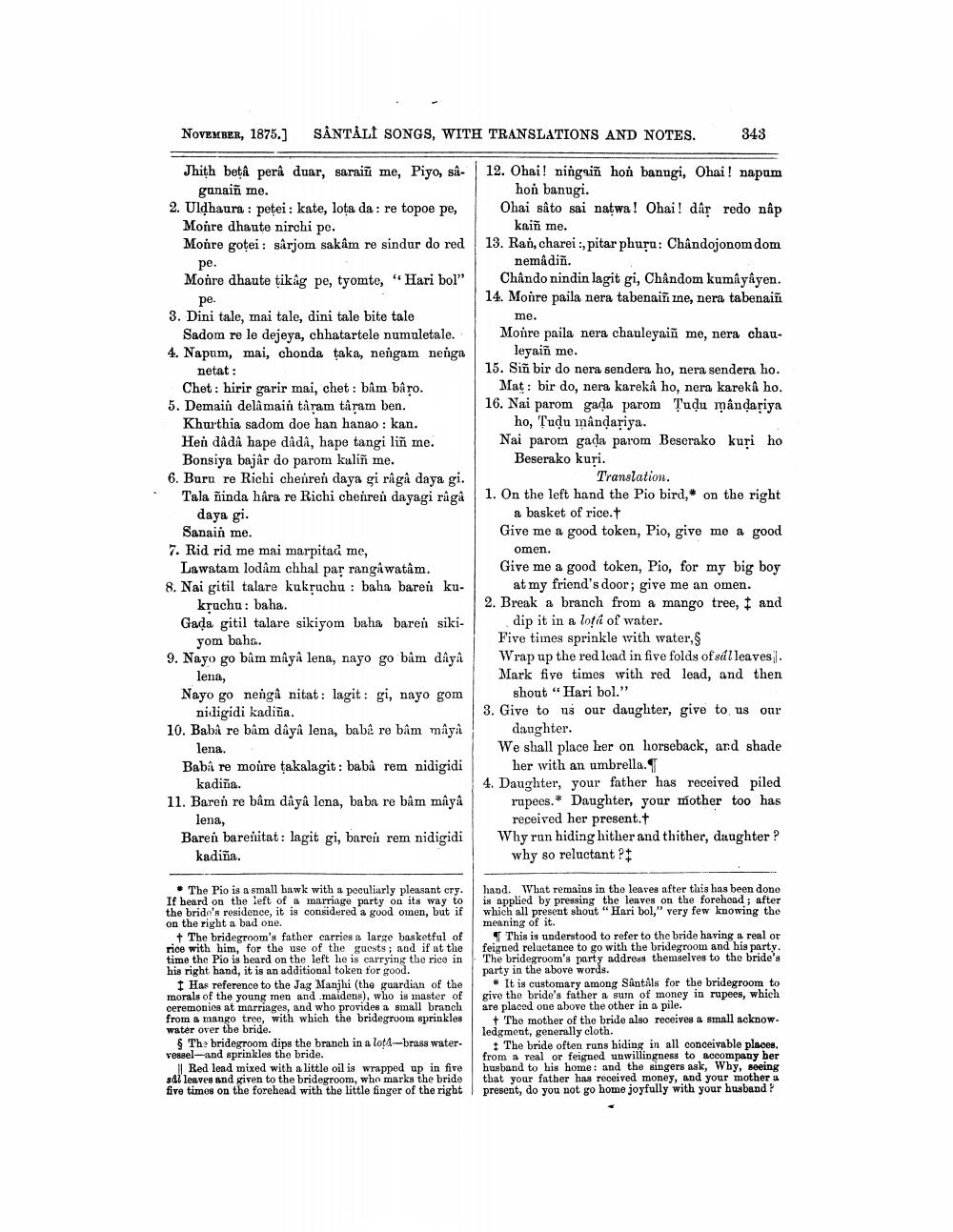________________
SANTALI SONGS, WITH TRANSLATIONS AND NOTES.
NOVEMBER, 1875.]
Jhith bețâ perâ duar, sarai me, Piyo, sâgunain me.
2. Uldhaura: peței: kate, lota da: re topoe pe, Monre dhaute nirchi pe.
Monre goței: sârjom sakâm re sindur do red 13. Ran, charei:, pitar phuru: Chândojonom dom
nemâdiñ.
pe.
Monre dhaute tikâg pe, tyomte, "Hari bol"
pe.
3. Dini tale, mai tale, dini tale bite tale Sadom re le dejeya, chhatartele numuletale. 4. Napum, mai, chonda taka, nengam nenga netat:
Chet: hirir garir mai, chet: bâm bâro.
5. Demain delâmain tàṛam târam ben. Khurthia sadom doe han hanao: kan. Hen dâdâ hape dâdâ, hape tangi liñ me. Bonsiya bajar do parom kaliñ me.
6. Burn re Richi cheiren daya giriga daya gi. Tala ñinda hâra re Richi chenren dayagi râgâ daya gi.
Sanain me.
7. Rid rid me mai marpitad me, Lawatam lodâm chhal par rangawatâm.
8. Nai gitil talare kukṛuchu: baha barei kukṛuchu: baha.
Gada gitil talare sikiyom baha baren sikiyom baha.
9. Nayo go bâm mâyâ lena, nayo go bâm dâyâ lena,
Nayo go nenga nitat: lagit: gi, nayo gom nidigidi kadiña.
10. Baba re bim dây lena, babi re bam mây
lena.
Baba re moire ṭakalagit: babâ rem nidigidi kadiña.
11. Baren re bâm dâyâ lena, baba re bâm mâyâ
lena,
Baren barenitat: lagit gi, barei rem nidigidi kadiña.
The Pio is a small hawk with a peculiarly pleasant cry. If heard on the left of a marriage party on its way to the bride's residence, it is considered a good omen, but if on the right a bad one.
† The bridegroom's father carries a large basketful of rice with him, for the use of the guests; and if at the time the Pio is heard on the left he is carrying the rice in his right hand, it is an additional token for good.
I Has reference to the Jag Manjhi (the guardian of the morals of the young men and maidens), who is master of ceremonics at marriages, and who provides a small branch. from a mango tree, with which the bridegroom sprinkles water over the bride.
§ The bridegroom dips the branch in a loța-brass watervessel-and sprinkles the bride.
Red lead mixed with a little oil is wrapped up in five sål leaves and given to the bridegroom, who marks the bride five times on the forehead with the little finger of the right
343
12. Ohai! ningaiñ hon banngi, Ohai! napum hon banugi.
Ohai sâto sai natwa! Ohai! dâr redo nâp kain me.
Chândo nindin lagit gi, Chândom kumâyâyen. 14. Monre paila nera tabenaiñ me, nera tabenaiñ
me.
Moire paila nera chauleyaiñ me, nera chauleyain me.
15. Siñ bir do nera sendera ho, nera sendera ho. Mat: bir do, nera karekâ ho, nera karekâ ho. 16. Nai parom gada parom Tudu mândariya ho, Tudu mândariya.
Nai parom gada parom Beserako kuri ho Beserako kuri.
Translation.
1. On the left hand the Pio bird,* on the right a basket of rice.†
Give me a good token, Pio, give me a good
omen.
Give me a good token, Pio, for my big boy at my friend's door; give me an omen.
2. Break a branch from a mango tree, and dip it in a lot of water. Five times sprinkle with water,§
Wrap up the red lead in five folds of sál leaves. Mark five times with red lead, and then shout "Hari bol."
3. Give to us our daughter, give to us our
daughter.
We shall place her on horseback, and shade her with an umbrella.
4. Daughter, your father has received piled rupees. Daughter, your mother too has received her present.†
Why run hiding hither and thither, daughter? why so reluctant ?‡
hand. What remains in the leaves after this has been done is applied by pressing the leaves on the forehead; after which all present shout "Hari bol," very few knowing the meaning of it.
This is understood to refer to the bride having a real or feigned reluctance to go with the bridegroom and his party. The bridegroom's party address themselves to the bride's party in the above words.
It is customary among Sântâls for the bridegroom to give the bride's father a sum of money in rupees, which are placed one above the other in a pile."
The mother of the bride also receives a small acknowledgment, generally cloth.
The bride often runs hiding in all conceivable places. from a real or feigned unwillingness to accompany ber husband to his home: and the singers ask, Why, seeing that your father has received money, and your mother a present, do you not go home joyfully with your husband?




